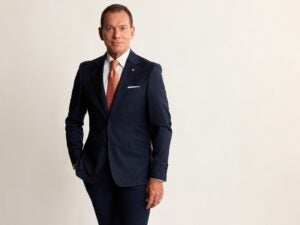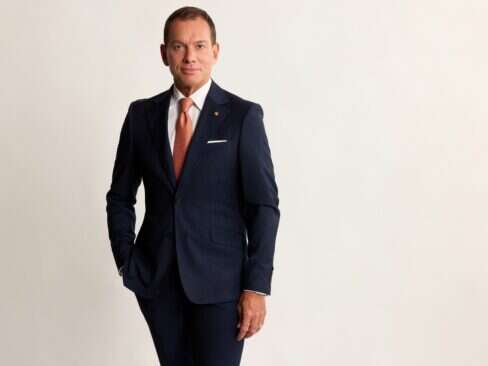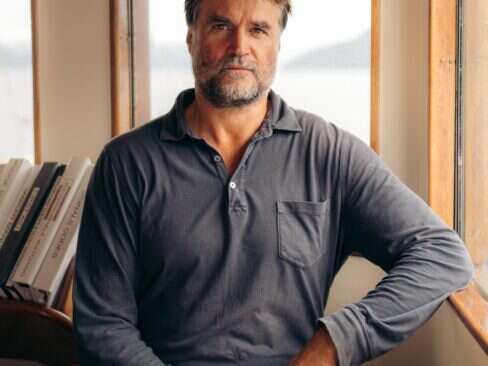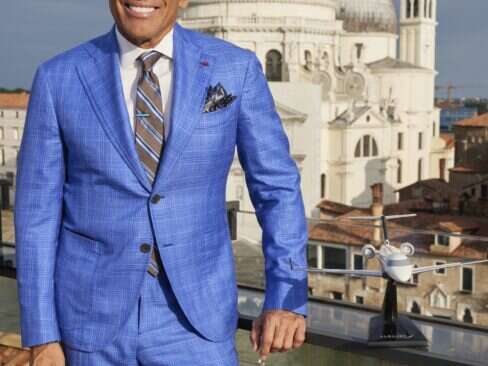
Chief Operating OfficerHalekulani Corporation
Using his upbringing in a culture-inspired household, and an education focused on art and photography at New York University, Peter Shaindlin’s career path may have been a bit different from most hoteliers. From bartending at clubs like Studio 54 to supervising events for Heads of State and Royalty at the United Nations, the native New Yorker has developed a reputation for looking beyond traditional hard and soft products as he seeks to compose unique experiences for his guests. The Chief Operating Officer for Japanese-owned Halekulani Corporation has cross-pollinated his Western business experience with the company’s Eastern roots bringing to fruition numerous innovations for guests. With more ideas ready to be implemented, he recently took time out of his busy schedule for a telephone conversation with Elite Traveler Editor-in-Chief Douglas Gollan.
ET: Tell us about your career path?
Peter Shaindlin: I’m a black sheep in the industry. I didn’t go to Cornell or Glion like so many others did. When I was young I supported myself through bartending, but at very old and more sophisticated establishments. I went to a mixology school that is no longer in existence, but it was very strict and very classical: One student was expelled for pouring sherry into a port glass. I worked at The Wings Club at the old Hotel Roosevelt, whose membership ranged from World War II pilots to top airline executives. I then was Assistant General Manager at the United Nations Dining Room during the Reagan years. We did many private events so I oversaw events for PM Gandhi, Desmond Tutu, President Reagan just to name a few. While I was there I met Joseph Verner Reed (Under-Secretary-General for Political & General Assembly Affairs) who really mentored me as a fledgling global executive. He had been the Executive Advisor to David Rockefeller (the CEO at Chase Bank) and also served as U.S. Chief of Protocol. From the U.N., I became Resident Manager of the Grand Bay New York, then Hotel Manager of The Stanhope on Fifth Avenue. Then I moved to the Caribbean with RockResorts, to Little Dix Bay. I was with Rosewood in the days when it was really the brilliant and visionary Atef Mankarios and founder Caroline Rose Hunt (owner of Rosewood during the time), and that was an amazing experience. After a while I wanted some time off, so I moved to St. Thomas, dropped the kids off at school everyday, worked on my art and photography. Mitsui (owner of Halekulani Corporation) eventually brought me to Hawaii. It was a great move and a great opportunity.
ET: What are the qualities that have been able to help you overcome your black sheep origins?
Peter Shaindlin: Here at Halekulani and along the way, I’ve been able to go back to the future by looking at the hotel’s heritage. Authenticity is extremely important in luxury. And of course, there is fine service. That’s what guests are paying for. But I really think my background in the arts has been key. I have a different approach in terms of being creative than most hotel managers. I believe the extent to which an hotelier can offer a deep and enriching experience is equal to the extent that he himself is cultured. For example, if one is positioning a classical French restaurant, does he understand the context of Escoffier’s cuisine in relation to the social norms of late 19th-century patrician Paris; does he understand prevailing influences of interior décor in the transitional Belle Epoque years? There’s a scene in part one of Anna Karenina that speaks to these sensibilities, where an elaborate restaurant meal takes place; it reveals the grandeur of the age and the expanded sense of time and leisure prevalent then in high society. A fine food and beverage director should be aware of this and what it represents. Another example is what books to put in the suites. To erudite guests paying thousands of dollars a night, the books in the room have the possibility to really mean something and change their experience and what they remember about their stay. It is this level of refinement and detail that I think has helped me, and it is what Halekulani has always been about as well.
ET: It sounds like your upbringing helped you quite a bit.
Peter Shaindlin: Yes a lot. My father was a film composer and my mother had thousands of books in the house. I thought everybody read Proust and Shakespeare! It wasn’t until I was in high school that it sort of struck me that most of the other kids weren’t very well cultured.
ET: Can you give a couple examples of the approach you’ve brought to The Halekulani?
Peter Shaindlin: I don’t believe in getting caught in a race to the same place. We never do trendy. We want to create relevant experiences. We always think about it from the perspective of the guest. So you know how so many times hotels have these nice sound systems but they really aren’t practical because you can’t hear the music if you are sitting out on the balcony? For the Orchid Suite we selected a new unmatched Steinway Audio system. It is the best of breed for sound in the world, period. For example, a guest can be on the patio and still play music but only the guest hears the music. People outside the area the guest is sitting can’t hear it.
On a larger scale there is the Vera Wang Suite. Every hotel has a Presidential Suite. It’s really unoriginal. I was watching Top Hat with Fred Astaire. It’s so romantic, and so I was thinking about romance, modern lifestyle and that natural path led to Vera Wang. We arguably received more media value in terms of publicity from the Vera Wang Suite than really any hotel suite before it. And by co-branding with Vera Wang we introduced Halekulani to an entirely new set of consumers who had the same appreciation for elegance and style. One more example would be “Art in Motion,” which gives guests in our three top suites access to a Bentley, Maserati or Aston Martin. The suites are $7,000 a night so the guests who stay there don’t drive the typical fleet rental cars at home. So my perspective is if they don’t drive that type of car at home, they come here on vacation or maybe business or business and vacation, why should they have to drive a car they normally wouldn’t? Even when you talk about sustainability, we were doing it six years ago. We got rid of all the trans fats back when we started noticing it was something our guests were asking about, long before it was trendy in the media.
ET: So what’s the next innovation?
Peter Shaindlin: The green movement is something we all do. Green is based on physical things, like anti-chemical detergent. We are moving towards what I call a ‘blue movement.’ Blue is body and mind, not just physical as ‘green’ is, but cerebral, spiritual as well. I’m planning to take things from wellness to ‘wholeness.’ So you go into a fitness center and there are televisions spewing out the same informational pollution you are trying to get away from by working out. So at the gym, or when you check into The Orchid Suite, you will have somebody who can provide spiritual engagement. They might make a suggestion about different exercises or might recommend some books, and the books might be available on a Kindle right there. Or perhaps a guest is interested in learning about Japanese Tea Ceremonies. We could bring someone over to their suite to talk to them about it and do a tea ceremony there. Maybe a guest wants to improve his chess game. We’ll bring in a chess grandmaster for private lessons, or just to talk about life strategy. When the guest leaves I want the guest to say, “I’ve never had an experience like that anyplace else. And I intend to return.”
ET: It sounds pretty ambitious.
Peter Shaindlin: I think for me, ambitious is minimum acceptable behavior at work! Here in Honolulu and on Oahu there are experts and authorities on virtually anything you can name throughout the community. We are probably one of the largest corporate sponsors of arts and culture here, and we are a large sponsor in the community. I’m just completing my term as Chairman of the Honolulu Symphony. Because of our involvement in the community, we are deeply connected to the community. During the downturn we didn’t have any layoffs; service is too crucial to what we are and what we stand for. The community loves The Halekulani so that provides us the ability to really tap into the amazing knowledge and expertise in the community and bring that to our guests.
ET: Having worked mainly for Western companies prior to coming here, what’s it like to work for a Japanese company?
Peter Shaindlin: It’s my seventh year. It rounded me out as a global executive. Our parent Mitsui Fudosan is global and dates its history back to the 1600s. It is one of the largest real estate companies in Japan. Japanese companies are very good at corporate discipline, strategy and planning. In the West, entrepreneurship and innovation is strong. The Japanese also tend to take a long-term view. For example, for the past several years we have been marketing in the U.K. and Europe because in a couple years when the Boeing 787 comes online, we expect nonstop flights from Europe to Honolulu. If you think that the global financial capitals of the world are Tokyo, New York and London, and with the 787 all three may eventually have nonstop flights to Hawaii, it makes sense, but most hotels wouldn’t start marketing until a couple months before the first flight. We’ll have relationships that have been in place for five or six years at that point. So that’s a tangible example of how we are combining both the Eastern and Western approaches to running a business to open up new opportunities.
ET: What about expansion? Halekulani Corporation has been talking about expanding for years but currently it is still just The Halekulani and The Waikiki Parc.
Peter Shaindlin: This goes back to the Japanese approach of planning and strategy. We said from the beginning that expansion would be based on finding the right property, not trying to fit a square into a round hole and then doing a lot of public relations. So the answer is we still plan to expand with the right opportunity. We aren’t trying to ramp up our stock price by telling investors we are going to have 100 hotels in three years, the typical approach. At the same time, Mitsui acquired The Imperial Hotel in Tokyo so we now have an alliance hotel in Tokyo, and we are exchanging information and helping each other in great ways. I was recently in Tokyo and the President of The Imperial and I are going to New York for a western media tour.
ET: Luxury hotels have really felt the pinch of the downturn. You said before you didn’t lay off staff. Have you made any changes?
Peter Shaindlin: When the crisis hit, most hotels switched gears and spent 80 percent of their time on finance and 20 percent on guests instead of the other way around. So we decided to intensify service even more. I told the staff we can’t cut our way to success, but service is more important than ever, because we really have a chance to excel past hotels that are cutting back—they’re feeding me an opportunity. I also challenged the team to find ways to enhance the guest experience but save money, and I mean enhance not cut. An example is the lobby area where we switched from fresh cut flowers to beautiful potted, growing orchids. Guests love the orchids and they actually increase the authenticity of the experience. We saved some money, yes, but for the guests, they actually comment about the orchids more than the flower arrangements. I say, the economy is bad—deal with it! The guests who can afford to come here shouldn’t have to suffer. In fact, by increasing our service we can really stretch our lead.
ET: What do you like to do in your free time?
Peter Shaindlin: I like long distance cycling and photography. I teach photography at University of Hawaii. I also enjoy high performance driving and racing. I like to drive my Lotus at high speed for self-discipline, perfection. Driving is really body and mind, and it’s also a good business lesson. When you are on the track, you realize ‘the tortoise and the hare’ are out. Speed is a critical business skill, but you also have to stay on the track. So I come back from a drive and start to think how can I apply that lesson to our business.
ET: Any other thoughts?
Peter Shaindlin: I’ve been fortunate to have earned a reputation for transcending the iconic—but my true aspiration is also to create them.
Our guests are important people who are well-to-do and worldly. We have two cardinal rules: Never waste their time and never violate their privacy. Many hoteliers don’t think about this, and therefore the staff doesn’t think about it. It’s a rule of life here.













